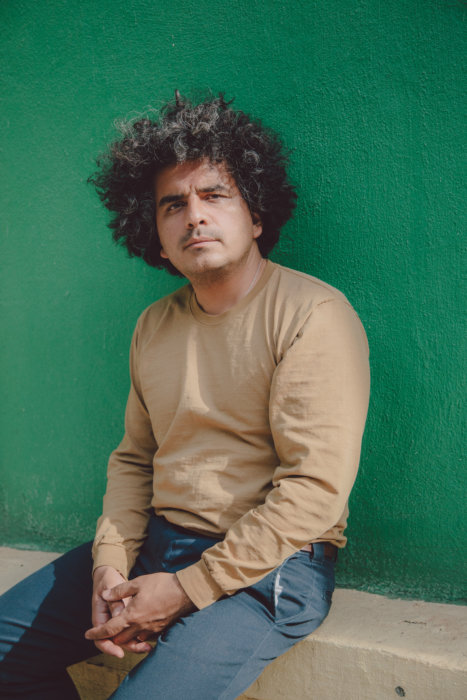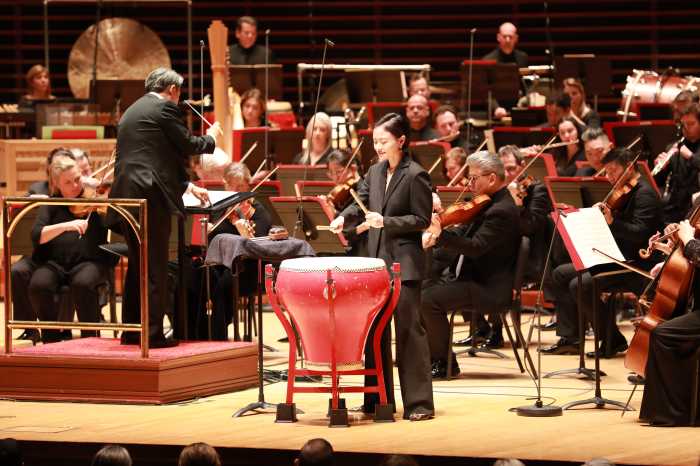El saltador de géneros ecuatoriano-estadounidense Helado Negro va con todo
El eterno forastero, multidisciplinario, el cantautor ecuatoriano-estadounidense Helado Negro ha mantenido una larga y singular carrera en el pop acústico-electro, experimental y sutilmente latino, gracias a que juega con las expectativas, incluidas las suyas.

La mayoría de las veces actuando solo o como una banda de un solo integrante, el sentimental Helado Negro cambia de carril en su primer álbum para el sello 4AD, ‘Far In’, lo suficiente como para dar la bienvenida a un conjunto musical más grande y un paladar más vivo de sonidos, contracciones rítmicas y vibraciones exuberantes y verdes que van más allá de lo habitual. Además de cambiar su estilo sonoro, Negro, comenzando con su último álbum antes de ‘Far In’, ‘This Is How You Smile’ de 2019, también ha cambiado la pauta en sus temas líricos lejos de lo abstracto a algo mucho más definido: la agonía de la familia y espiritismo.
Antes de su próximo show en vivo en Underground Arts el 1ro de mayo, A.D. Amorosi de Metro habló con Helado Negro.
Amorosi: Creo que ‘This Is How You Smile’ y ‘Far In’ se benefician de inmersiones más profundas que las habituales en los ámbitos familiar y espiritual. ¿Por qué ha ocurrido esto en estos dos álbumes?
Negro: Familiar es espiritual. Uno no puede existir sin el otro. Por mucho que me encantó ‘This Is How You Smile’, sentí que tenía otro lado. ‘Far In’ fue más pacífico, pero realmente emocionante de hacer y gratificante de una manera completamente diferente a ‘Smile’.
Amorosi: En ‘Far In’, ya sea algo vigorizante como ‘Aguas Frías’ o la canción de cuna ‘Agosto’, ¿cómo decides cantar en español o ecuatoriano? ¿Es solo instintivo?
Negro: Es instintivo, y es, por supuesto, caso por caso. Cada canción se me revela a través de sus sonidos y de lo que estoy cantando. A veces, los temas no son necesariamente nada más que ideas que se combinan. No es necesariamente un sentimiento específico, ya sea por amor a una pareja íntima o desamor. Y a veces lo es. ‘Aguas Frías’ es, literalmente, sobre la sensación que tuve al visitar este lugar en Texas. Fue abrumador. Su naturaleza era única y me hizo sentir algo que nunca antes había sentido: una conexión realmente profunda con la tierra, los matices de la tierra y el arrepentimiento de no haber pasado más tiempo con la naturaleza, al aire libre. Es un llamado a tener esta relación realmente especial con el mundo exterior, los humanos y la naturaleza, por cursi que suene. Saber que estamos juntos y que existe una profunda conciencia de la naturaleza como uno es realmente profundo. Es como no querer hablar nunca del clima. Es como evitar hablar del cambio climático… está aquí. Tenemos que vivir con eso.
Amorosi: Siempre eres un artista y siempre eres ecuatoriano-estadounidense, y toda tu herencia/cultura está siempre presente en toda tu música. ¿Cómo infundiste específicamente tu cultura y tus experiencias a través de ‘Far In’?
Negro: Creo que, como cualquier otra persona que hace música o cualquier tipo de arte, tenemos experiencias todos los días que están enterradas en nuestro subconsciente, cosas que sientes o sabes que son literales como el lenguaje o la comida. No sé si lo pienso más allá de ser yo mismo. Lo que sale, sale por defecto.
Amorosi: ¿Cómo llegar de manera diferente a las audiencias de habla hispana que a las audiencias angloparlantes, en particular en un entorno en vivo?
Negro: La representación hace una gran diferencia. Estoy diciendo mi verdad, desde mi propia experiencia y se relaciona con personas que crecieron como yo. En cuanto a las personas de las comunidades anglo o caucásicas, pueden relacionarse conmigo a través de mi música y mis canciones. Tienen curiosidad, tal vez, por comprender otras culturas al igual que yo tengo curiosidad por otras culturas que no son la mía. Con eso, la música termina siendo un unificador realmente genial de una manera muy especial. Es literalmente mágico.
The eternal outsider, multi-discipline, Ecuadorian-American singer-songwriter Helado Negro has maintained a long and singular career in subtly Latin-laced, experimental, acousto-electro pop by gaming expectations—his own included.
Most often on his own and acting as a one-man-band, the soulful Negro switches lanes on his first album for the 4AD label, ‘Far In’, enough so to welcome a larger musical ensemble and a livelier palate of textured, layered sounds, rhythmic twitches, and lushly verdant vibes that go beyond his usual. Along with changing up his sonic stylings, Negro – starting with his last album before ‘Far In’, 2019’s ‘This Is How You Smile’ – has also moved the needle on his lyrical themes from the abstract to something far more definite—the throes of family and spiritualism.
In advance of his upcoming live show at Underground Arts on May 1, Metro’s A.D. Amorosi spoke to Negro.
Amorosi: ‘This Is How You Smile’ and ‘Far In’ benefit from, what I believe, are deeper dives than your usual into the familial and the spiritual realms. Why has this occurred coming into these two albums?
Negro: Familial is spiritual. One can’t exist without the other. As much as I loved ‘This is How You Smile’, I felt as if there was another side to it. ‘Far In’ was more peaceful, yet really exciting to make, and gratifying in a completely different way than ‘Smile’.
Amorosi: On ‘Far In’, whether it is something bracing with ‘Aguas Frías’ or the lullaby-like ‘Agosto,’ how do you decide to sing in Spanish or Ecuadorian? Is it just instinctual?
Negro: It is instinctual, and it is, of course, on a case-by-case basis. Each song reveals itself to me through its sounds, and what I’m singing. Sometimes the themes aren’t necessarily anything but ideas that are collaged together. It isn’t necessarily a specific feeling, whether it is about love of an intimate partner or heartbreak. And sometimes it is. ‘Aquas Frias’ is, quite literally, about the feeling I got when visiting this place in Texas. It was just overwhelming. Its nature was unique and made me feel something that I had never felt before: a really deep connection to earth, the nuances of earth and the regret that I had not spent time more time with nature, the great outdoors. It is a call toward having this really special relationship with the outside world and humans and nature – as hokey as it sounds. Knowing that we’re together and that there is a deep awareness of nature as one is really profound. It’s like never wanting to talk about the weather. It’s like avoiding talking about climate change… it’s here. We have to live with it.
Amorosi: You are always an artist and you are always Ecuadorian-American, and all of your heritage/culture is ever-present in all of your music. How specifically did you infuse your culture and your experiences through ‘Far In’?
Negro: I think like anyone else who makes music, or any kind of art, we have experiences everyday that are buried in our subconscious, things that you feel or know that are literal like language or food. I don’t know that I think about it beyond me being myself. What comes out, comes out by default.
Amorosi: How do reach out differently to Spanish speaking audiences than Anglo speaking audiences, in particular in a live setting?
Negro: Representation makes a big difference. I’m speaking my truth, from my own experience and it relates to people who grew up like me. In terms of people in Anglo or Caucasian communities, they can relate to me through my music and my songs. They are curious, perhaps, in understanding other cultures just as I am curious about other cultures that aren’t mine. With that, music winds up being this really cool unifier in a really special way. It’s literally magic.





























